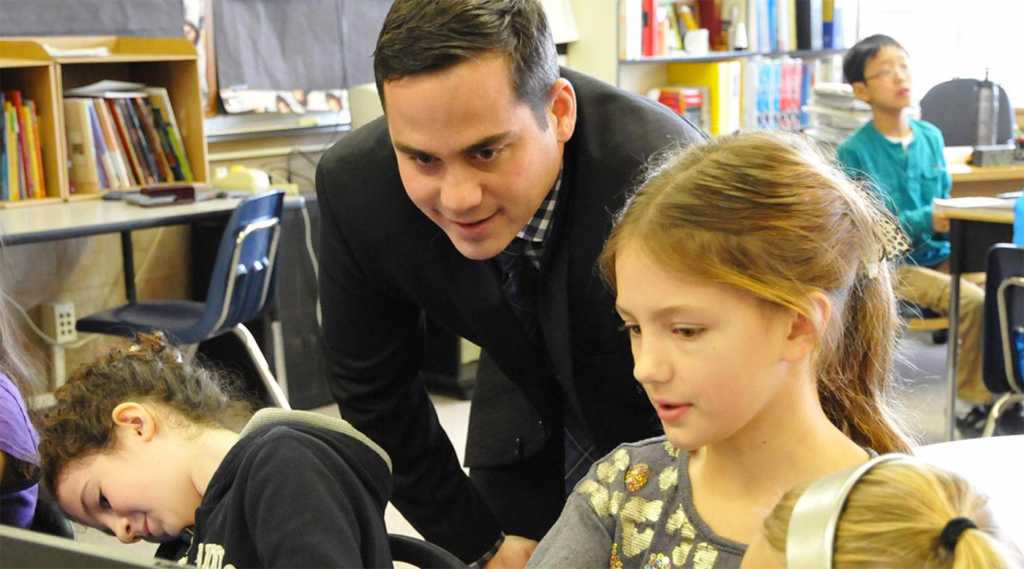Page 398 • (4,135 results in 0.019 seconds)
-

a focus on best practices, candidates will learn how to support achievement of all students, evaluate instruction and lead learning. High-Touch – Small cohorts allow for individualized coaching, engaged discussions and meaningful feedback. Balance – The simultaneous internship paired with coursework allows for interns to practice theory while reflecting on leadership effectiveness. Convenient Schedule – Summer courses are held in the evenings to accommodate interns who are working throughout the
-
introducing yourself to the panel of judges, learning to be calm, taking a brief pause after the question and then sharing your ideas, remembering to smile when you speak, and talking slowly and clearly. You make a mental note to thank the judges for their time at the end and shake their hand with a smile. You decide that you will be the version of yourself that seeks to grow through this experience. The advisor shares that what sets competitors apart is their focused preparation, and willingness to walk
-
: Integrated Learning Objectives INOV: Innovation Studies INTERN: Internship IP: In Progress Grade IS: Independent Study IT: Interpreting Text GenEd Element J-Term: 4 weeks, January Term JR: Junior KINS: Kinesiology LPN: Licensed Practical Nurse LTST: Latino Studies M.A.: Master of Arts M.A.E.: Master of Arts in Education M.B.A.: Master of Business Administration M.F.A.: Master of Fine Arts M.S.: Master of Science M.S.N.: Master of Science in Nursing MATH: Mathematics MFTH: Marriage and Family Therapy MILS
-
, University of Washington-Seattle and Sephardic Studies Program Chair Convener: Dr. Beth Griech-Polelle, Kurt Mayer Chair of Holocaust Studies and Associate Professor of History, PLU 8:15 p.m. – AUC Gray AreaPlease join us for a dessert reception following the keynote.Thursday, November 7th9:30 a.m. – AUC Gray AreaRegistration & Coffee 10:00 - 11:15 a.m. – ``Learning about Sephardic Jews and the Holocaust,`` AUC Regency RoomLauren Granite, US Education Director, Centropa, “PreWar Sephardic Jewry” Lori
-
conference focuses on animating worship, learning and service with and through Scripture with Samuel Torvend, Ph.D. and university chair of Lutheran studies. More Information Jazz Under the Stars Every Thursday 7-9 p.m. July 7 through Aug. 11 PLU’s free outdoor jazz concerts kick off July 7 with a performance by the swinging Casey MacGill Orchestra at the Mary Baker Russell Amphitheater. More Information Annual Berry Festivals June 8, July 13, Aug. 3 in Red Square from 11 a.m.-1 pm Each berry festival at
-

is a great way to get teaching experience – something I might like to explore after graduation.” “I’m still exploring different careers and I also enjoy working with children,” added Escobar. She mentioned her interests to her faculty adviser, Shannon Seidel, assistant professor of biology. Seidel introduced Escobar to the Noyce program. This year’s program dispatched PLU students to five area elementary and middle schools through a service learning science education course. The cross
-
Reconnect Learn about upcoming connection events, the Lute Link program and see a roundup of photographs from Homecoming and Family Weekend 2016. View Now Travel Journals Four alumni share their study away experiences in Antarctica, Namibia, Norway and Oaxaca. These first-person travel journals uplift the learning they did abroad as well as the effect global education had on their lives. View Now #LutesAway Explore current and past social media posts from students who study away. Through the #LutesAway
-
. Walking to the supermarket means learning the life story of at least two people.” Reflection is a vital part of the study away experience and when Aubrey took a moment to look back at her time in Trinidad & Tobago, she realized that she had learned a lot about herself, “I am a woman. I am white. I am American. I studied away in a country of predominately African, East Indian and Chinese roots. I stood out amongst the crowd with my accent and my skin. I was the minority, and yet, I still held a
-
context as to why they choose not to use the particular word or phrase, thus stressing the importance of taking responsibility for the impact we have on others. As we continue to assess our diversity and equity commitments and efforts to actualize our mission of valuing diversity as intrinsic to the vitality of learning, resilience, and growth, the My Language, My Choice: Words Mean Things (WMT) campaign emerged. The My Language, My Choice: Words Mean Things campaign focuses on taking responsibility
-

learn to do better for/by your students. Fortunately, I work with a district that believes this too and a staff committed to learning and supporting each other. Simply put, it has really hit home for me to be selected as an ASCD emerging leader. You spent nearly a decade serving at the high-school level prior to transitioning to an elementary school. What motivated that transition; what do you enjoy about elementary schools, and what do you miss about high schools? I have had a unique journey that
Do you have any feedback for us? If so, feel free to use our Feedback Form.


